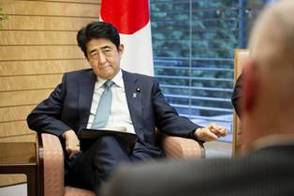 Source: WSJ
Source: WSJ One presenter with some interesting thoughts about the Australia-Japan security relationship was Mike Green of the Center for Strategic and International Studies in Washington DC. After outlining what he thought the white paper had done well, and the consensus among all the speakers was that the 2016 White Paper was a significant achievement and worthy of admiration, he did point to two areas where he thought some more attention could have been given. While the White Paper does note that Japan is becoming more important to Australia in the region, it does not really explain the strategic need for closer co-operation between both countries. That itself may be a consequence of trying to avoid straying into uncomfortable territory vis-à-vis security threats and changes in power structures, but if Australia is going to work more closely with Japan then there needs to be an explanation of why that is necessary and how the defence relationship will be shaped.
Mike Green`s other point was that the conference didn`t pay much attention to North Korea. Again, this may be because the conference itself mainly wanted to examine how to deliver the many capabilities outlined in the White Paper. However the threat of a nuclear armed North Korea is not one that any state in the region can afford to dismiss or treat with nonchalance. For the countries of Northeast Asia, North Korea is the time bomb that could unravel stability in an instant and affect trade and markets across the region. That would have a direct impact on Australia and its economy, and bring about the type of economic crisis that the country has tried to avoid for more than 80 years. Hence more attention needs to be paid to North Korea, for it is an anomaly that could threaten internal Australian security, and must be dealt with seriously.
Another interesting observation to emerge from the conference was Allan Behm`s forceful criticism of what he calls Australia`s `smug` approach to Asia. Behm noted that while one of the key speakers of the conference was former Indonesia President Susilo Bambang Yudhoyono, and that even though Australia had never had a better friend in Indonesia than SBY, not one federal politician of any persuasion nor any federal department head had bothered to turn up to listen to SBY talk. This, said Behm, was a symptom of the smug complacency in Australia towards our relationship with Asia. In Behm`s view, Australia treats Asia with something approaching disdain, that our relations with Asia are superficial at best and dismissive at worst, and that it is unforgivable in today`s climate not to be forging an interest in Asia among our social and economic leaders.
This is a view that echoes my own thoughts on the subject, for the distinct lack of regional curiosity among what might be described as the `executive class` of Australian society hinders the ability of Australia to make itself heard in the region and be understood. Most of our leaders speak only one language, English, and if they speak another it is predominantly European in origin. While the government is going some way to rectifying this through its use of the New Colombo Plan, the scale of the transformation in Australian social thinking on Asia needs to be far broader than the NCP can deliver. It ultimately comes down to the responsibility of the individual to educate themselves about Asia, to learn about its cultures, languages, institutions, and values.
So these are some of the issues that were brought up during the course of the conference. On another note, Japan observers would already be well aware that PM Shinzo Abe attended the global nuclear security summit held in Washington DC from March 30 through to April 2 this year, in which he discussed nuclear issues, while bringing up the need for more work on economic co-operation (aka support the TPP), and how Japan would be pushing this agenda at the G7 meeting coming up at Ise Shima later next month. In an interview with the Wall Street Journal, Abe also touched upon the `Trump` factor in this year`s US presidential race, noting that for Japan, it would be unthinkable to suddenly have no US presence in the country. Interestingly enough, Abe also aired his views on what he believes is the need to use the G7 to show leadership over the issue of `naked nationalism`, by which he appeared to be referring to the behaviour of China in the South China Sea and East China Sea, not to mention Russia`s activities in eastern Europe and Ukraine.
So there has been much to think about over the past week, and I expect to be coming back to a few issues raised here very soon.
 RSS Feed
RSS Feed